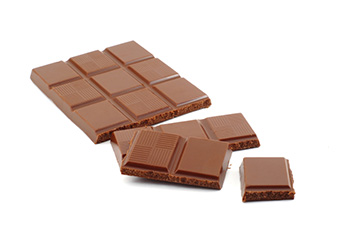More Health and Nutrition Bites
Related
Hot Chocolate for High Blood Pressure?
It's a good idea for those with high blood pressure to make sure they're getting enough fruits and vegetables in their diet. Not just for overall health, but because the polyphenols, or flavonoids, in fruits and vegetables have been linked with reduced blood pressure and lower risk of heart disease. Yet the foods with the largest amounts of polyphenols are not foods at all but beverages - tea and cocoa.
'Tis the Season for Cocoa....
Especially, it appears, if you have heart disease. Like tea, coffee and wine, cocoa is rich in flavonoids - plant compounds that have been associated with a reduced risk of Alzheimer's Disease, as well as improving cholesterol scores and even high blood pressure.
Caffeine and Atrial Fibrillation
You may not realize it, but your heart is an electrical system. Each beat of your heart is started by an electrical pulse of what is called the sinus node, which is in the upper part of the right atrium (the top section of your heart, towards your right side). In normal sinus rhythm, the sinus node sends electrical impulses to the two upper chambers of your heart, the atria, and they then contract, or beat, simultaneously.
Health & Nutrition Bites
Get the latest health and diet news - along with what you can do about it - sent to your Inbox once a week. Get Dr. Gourmet's Health and Nutrition Bites sent to you via email. Sign up now!
Avoid A-Fib with Chocolate

Cocoa, the most important ingredient in chocolate, is a fantastic source of flavanols, a type of polyphenol with antioxidant and anti-inflammatory effects. We've seen in other Health & Nutrition Bites that hot cocoa is good for high blood pressure and may help slow the progression of heart disease. Atrial fibrillation (or a-fib) is a relatively common heart arrhythmia which is associated with a higher risk of stroke, heart failure, and cognitive impairment, whose root causes seem to include an inflammatory cascade: might the anti-inflammatory and heart-healthy benefits of chocolate have some effect on atrial fibrillation?
A team in Denmark analyzed data from an ongoing, large-scale, prospective public health study known as the Danish Diet, Cancer, and Healthy Study (Heart 2017;0:1-5 doi:10.1136/heartjnl-2016-310357). Between 1993 and 1997 over 57,000 adult men and women were invited to participate in the study, which included a detailed food-frequency questionnaire as well as clinical measures (like height and weight as well as blood pressure and cholesterol scores) and demographic information.
All Danish citizens have a personal ID number, so with the participants' permission, the authors were able to utilize the National Patient Register, the national medical record, to identify those participants who were diagnosed with an incident of atrial fibrillation.
For their analysis, the authors excluded those participants whose food frequency questionnaires were incomplete, those with a history of cancer, and those who experienced incidents of a-fib prior to the start of the study. This left them with 55,502 men and women between the ages of 50 and 64.
After taking into account sex, Body Mass Index, systolic blood pressure (the top number in your blood pressure reading), total cholesterol, caloric intake, coffee and alcohol consumption, smoking status, and education along with other diagnoses like diabetes or high blood pressure, the authors compared the chocolate intake of those who were diagnosed with atrial fibrillation with that of those who did not.
For the purposes of the study, the researchers did not differentiate between dark and milk chocolate, although they note that the most common type of chocolate consumed in Denmark is 30% cacao (milk chocolate). Compared with consuming chocolate less than once per month, those who ate between one and three 1-ounce servings of chocolate per month were 10% less likely to experience a-fib. Those who ate 1 serving per week were 17% less likely, and 2-6 servings per week reduced the risk by 20%. That said, 1 or more servings daily only reduced the risk by about the same amount as consuming 1 serving per week: about 16%.
There's been some concern about the effect of caffeine on atrial fibrillation: accordingly, the authors performed an additional analysis that also took into account total caffeine intake (and not just coffee intake), finding that the results were "almost identical" to their previous results.
It's interesting that the strongest results were different for men and women. For women, just 1 serving (1 ounce) of chocolate per week was associated with a 21% lower risk of atrial fibrillation, while for men, consuming 2-6 servings per week meant a lower risk of 23%.
What this means for you
Chocolate is great for you - in moderation, and bearing in mind that it does contain calories that you may not need. If you have a-fib and have been avoiding chocolate because of its caffeine content, show this column to your physician and discuss with them whether you should continue avoiding it.
First posted: May 31, 2017
